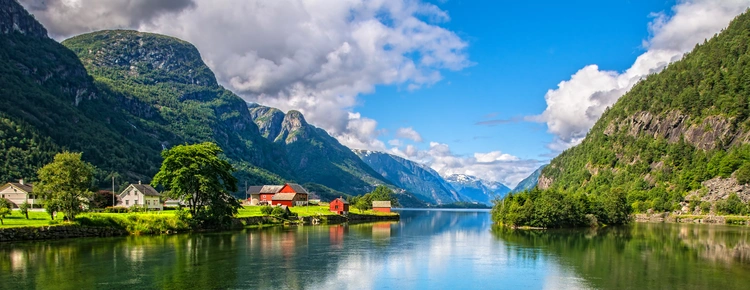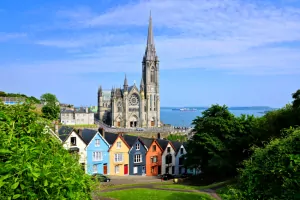
A “Way Out” From Global Crisis
Are you looking for a “way out”?
With everything that’s going on in the world… war in the Middle East… war in Ukraine… seemingly endless political dysfunction in the United States… we could all be forgiven for wanting an escape.
I’m not talking about a vacation…
I’m talking about a “bolthole” where you feel safe. Where, even if there’s a crisis going on elsewhere in the world, it doesn’t have to bother you.
To put it mildly, our world faces some hefty problems. War… the effects of climate change… ongoing inequalities…
But it goes without saying that some countries are better prepared for these challenges than others.
Some countries are better prepared for crises… or less likely to experience the worst outcomes from a crisis.
We saw that during the COVID-19 pandemic, which did not hit every country equally.
The strength of a country’s government… its wealth (or lack) of natural resources… and its relationships with its neighbors and trade partners… all play a role in helping any nation to weather a crisis.
Next week, Simon Letter will publish an extensive study of various countries’ preparedness for the next major global crisis…
But as you know… Lief’s and my beat is expat life and moving overseas. From our point of view, there’s no point knowing that a country is well prepared to weather the next crisis… if you can’t actually move to that country quickly and easily and take advantage of all it has to offer.
For example, New Zealand is one of the world’s most politically stable countries, rich in water reserves, very safe, and quite climate-change friendly… but it’s difficult to move there to live, unless you’re moving for a specific job or to start a particular business. And foreigners can’t own property in most circumstances.
It’s interesting to know which countries will survive the coming storms… but it’s much more useful to be able to make a plan so that you can not only survive, but thrive—no matter what happens in the world.
The most important consideration in any “bug out” plan is residency. You’ll want to establish residency in at least one other country (and owning property there is also ideal).
Having a bug out plan isn’t about doom or gloom or being paranoid. It’s about being prepared for the consequences of life-changing conditions. And setting up a second residency and home overseas is a good investment regardless of the outcome.
Even if the worst-case scenario never happens, you’d have somewhere that you could call home indefinitely or use as a potential vacation or retirement destination.
Here are some highly resilient… safe and peaceful… countries where you might consider getting a “Plan B” residency right now.
Go Offshore Today
Sign up to our free twice a week dispatch Offshore Living Letter
and immediately receive our FREE research report
on how to live tax-free today, while earning up to $215,200!
1. Ireland

Ireland is a much-romanticized country, with some of the top-ranking places in the world to visit or live (like the cities of Dublin and Galway, or the Wild Atlantic Way, the longest coastal tour in the world).
However, Ireland is also blessed with resilience… Its political system has been stable for a century, and it’s one of the most peaceful
countries in the world.
Ireland has maintained military neutrality since before World War 2.
It experiences petty and drug-related crime, like anywhere, but the murder rate is an enviable 0.44 per 100,000 people (as of 2021). Plus, terrorism risk is very low in Ireland (at least since the end of “The Troubles” in Northern Ireland, brought about by the Belfast Good Friday Agreement in 1998).
The peaceful nature of the country is exemplified by the small size of its armed forces (7,000 or so in total) and the fact that ordinary police are generally unarmed.
Ireland’s demographics are generally better than the rest of Europe, though birth rates are dropping. The middle class is strong at around 66%.
Ireland has the second-highest GDP per capita in the world—though this is at least in part a distortion caused by the number of large multinational companies drawn to the country for its low corporate taxes.
Ireland’s debt to GDP ratio is an enviable 58%, though this could change if the multinationals leave.
Even better: Ireland is highly food secure. This small country of 5 million produces enough food for 45 million people.
Residency in Ireland is easily available to anyone who can show 50,000 euros a year in income.
2. Norway
Norway has plentiful freshwater reserves, with 70,000 m3 per capita—one of the highest reserves in the world. Most of Norway’s electricity comes from its ample
hydroelectric power systems. This, plus the vast North Sea oil and gas reserves, make Norway fully energy independent.
Norway is also very safe, with an ultra-low murder rate of 0.54 per 100,000 in 2021. All other forms of crime are low, too.
Norway shares a 200-kilometer border with Russia in the Arctic… but as a NATO member, there is little chance Norway would ever be invaded.
Due to its northerly location, it’s exposed to storms, floods, and landslides, but it has the resources and experience to easily manage these. Climate change will pose
less of an issue in Norway than most other countries because it has little low-lying land that could be affected by sea-level rises.
The median age in Norway is just under 40 years, a reasonably young age for a western economy, and the middle class encompasses a whopping 80% of society.
Norway is one of the most equal countries in the world… which makes social cohesion very high.
As compensation for high taxes, Norway offers excellent, and generally free, public services including health care, education, pre- and after-school care, and
much more.
However, rates of entrepreneurship are lower than in countries such as Ireland. High taxes and strong social safeguards reduce the benefits of risk-taking in
businesses.
While there is no Norwegian Golden Visa, it’s relatively easy to get residency. Skilled workers are welcomed… or anyone willing to invest just 100,000 euros in
a company that creates jobs.
After three years you can apply for permanent residency and after seven years as a resident, you become eligible for citizenship.
Go Offshore Today
Sign up to our free twice a week dispatch Offshore Living Letter
and immediately receive our FREE research report
on how to live tax-free today, while earning up to $215,200!
3. Uruguay
Uruguay offers a high standard of living, a temperate climate, great beaches, and welcomes foreigners.
Uruguay is recognized as having the strongest democracy in the Americas… as well as being the least corrupt country in Latin America.
It also enjoys the largest middle class in the Americas, encompassing over 60% of the population. And, demographically, the average age is an enviable 35 years old.
There’s little fear of invasion or terrorism.
Moreover, according to the UN’s Food and Agriculture Organization, Uruguay ranks second globally for food self-sufficiency.
In 2018 Uruguay had over 10 times the global average freshwater reserves per capita, at 26,000 cubic meters.
In short, Uruguay is a haven of stability in an often-unstable part of the world.
You can get residency here easily. Show that you have income of at least US$1,500 per month to support yourself—and you can qualify.
Until next time,
Kathleen Peddicord
Founding Publisher, Live And Invest Overseas




